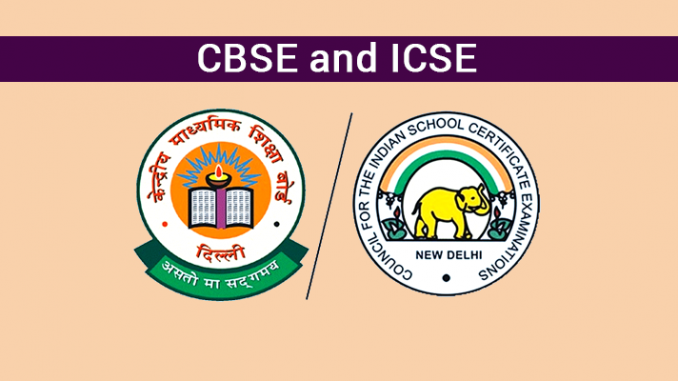Overview of CBSE Board

An extensive network of schools is supervised by the Central Board of Secondary Education (CBSE), a well-known educational board in India. Because it is a national-level board, it is acknowledged and recognised throughout India. The purpose of the CBSE was to create a standardized, superior educational system. The board administers the Secondary School Examination (SSE) for Class 10 and the All India Senior School Certificate Examination (AISSCE) for Class 12.
Overview of ICSE Board

The Indian Certificate of Secondary Education (ICSE) is another prominent educational board in India. Unlike CBSE, ICSE is not a national board but is primarily concentrated in certain states. The ICSE board is renowned for its thorough and demanding curriculum, which is created to offer a comprehensive education. Indian Certificate of Secondary Education (ICSE) and Indian School Certificate (ISC) exams are administered by the ICSE for classes 10 and 12, respectively.
Key Differences Between CBSE and ICSE Board
The ICSE CBSE is Indian Certificate of Secondary Education and Central Board of Secondary Education respectively. If we will be doing icse vs cbse then, here are some key differences between CBSE and ICSE boards.
Curriculum Approach:
CBSE follows a more application-based approach, focusing on practical knowledge. Whereas, ICSE has a comprehensive curriculum that emphasizes in-depth understanding of subjects.
Language of Instruction:
CBSE primarily uses English as the medium of instruction. Whereas ICSE allows flexibility in choosing the medium of instruction, including English and regional languages.
Examination Pattern:
CBSE exams are known for their straightforward and objective questions. Whereas ICSE exams are considered more challenging due to their elaborate question patterns.
Recognition:
CBSE is recognized and accepted throughout India, making it a suitable choice for students who may relocate frequently. Whereas, ICSE is not as widely recognized as CBSE and is primarily prevalent in certain states. This is the major difference between cbse and icse.
Focus on Extracurricular Activities:
CBSE schools often have a structured approach to extracurricular activities. Whereas ICSE schools encourage a more comprehensive involvement in extracurricular activities, including projects and community service.
Syllabus Type of CBSE Board
The CBSE syllabus places a strong emphasis on practical knowledge and application to give students a well-rounded education. Here are some essential components of the CBSE curriculum:
- Standardized Curriculum: CBSE provides a uniform curriculum across all affiliated schools, ensuring consistency in education.
- NCERT Books: CBSE recommends the use of NCERT (National Council of Educational Research and Training) books, which are known for their clarity and quality.
- Emphasis on Science and Mathematics: CBSE places a strong emphasis on science and mathematics subjects, which are considered essential for competitive exams.
- Flexible Elective Subjects: CBSE offers a range of elective subjects, allowing students to choose based on their interests and career goals.
Syllabus Type of ICSE Board
The ICSE syllabus is known for its depth and comprehensiveness. Here are some key aspects of the ICSE syllabus:
- In-Depth Study: ICSE promotes an in-depth understanding of subjects, requiring students to delve into various topics.
- Varied Subjects: ICSE includes a wide range of subjects, including arts, science, commerce, and vocational courses.
- Importance of English: ICSE places significant importance on the English language, ensuring that students have strong communication skills.
- Project Work: ICSE includes project work in various subjects, promoting research and practical learning.
Conclusion
If you are looking, which is better cbse or icse? To answer this question, choosing between CBSE and ICSE depends on various factors, including your location, educational preferences, and career goals. CBSE is a national board with a more standardized curriculum and is widely recognized, making it a suitable choice for students who may need to relocate. On the other hand, ICSE offers a comprehensive education with a focus on in-depth learning and is an excellent choice for those seeking a holistic educational experience. Ultimately, the best board for you is the one that aligns with your individual needs and aspirations.
Download PPT on Difference between CBSE and ICSE

Video on Difference between CBSE and ICSE
FAQs on Difference between CBSE and ICSE
1. Which is better for the future, ICSE or CBSE?
Ans: The choice between ICSE and CBSE depends on your educational preferences and career goals. If you prefer a standardized curriculum and wide recognition, CBSE may be a better choice. However, if you seek a more comprehensive and in-depth education, ICSE could be a suitable option.
2. Why is CBSE more popular than ICSE?
Ans: CBSE’s popularity can be attributed to its standardized curriculum, wide acceptance across India, and its reputation for preparing students well for competitive exams. It also has a larger network of affiliated schools compared to ICSE.
3. Is CBSE harder than ICSE?
Ans: The difficulty level of CBSE and ICSE boards varies depending on individual perspectives. CBSE is often considered more straightforward with a focus on practical knowledge, while ICSE is known for its comprehensive and rigorous curriculum. The perceived difficulty can also depend on the student’s aptitude and preparation.
4. What are the top 5 rules in ICSE?
Ans: The “Top 5” rule in ICSE is a provision that allows students to choose their five best-performing subjects out of the total subjects they appear for in the ICSE board examination. These five subjects are considered for calculating the final result, and the other subjects are listed as additional.












